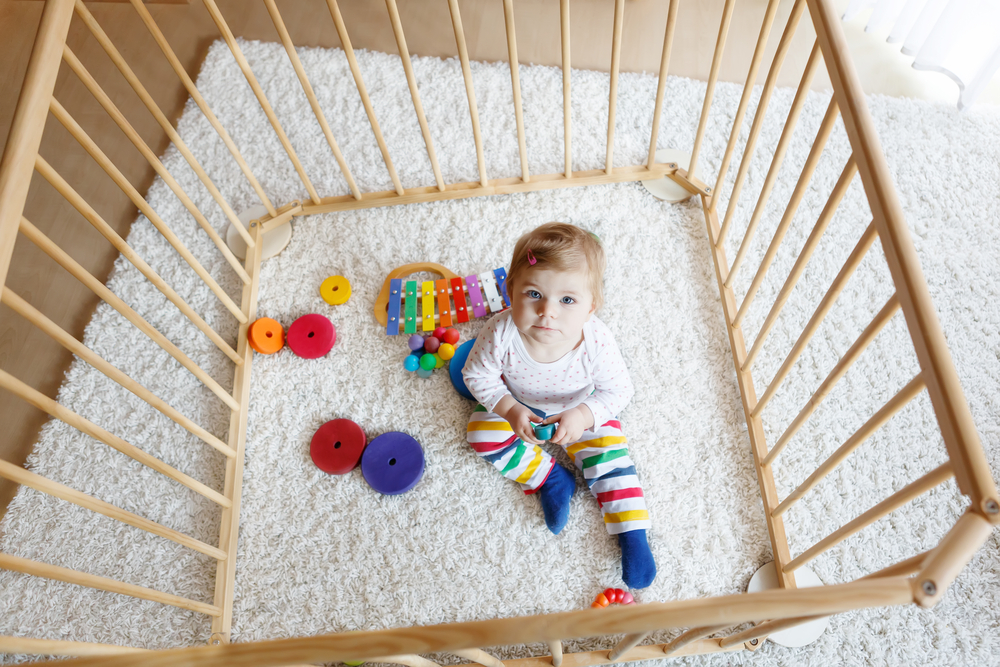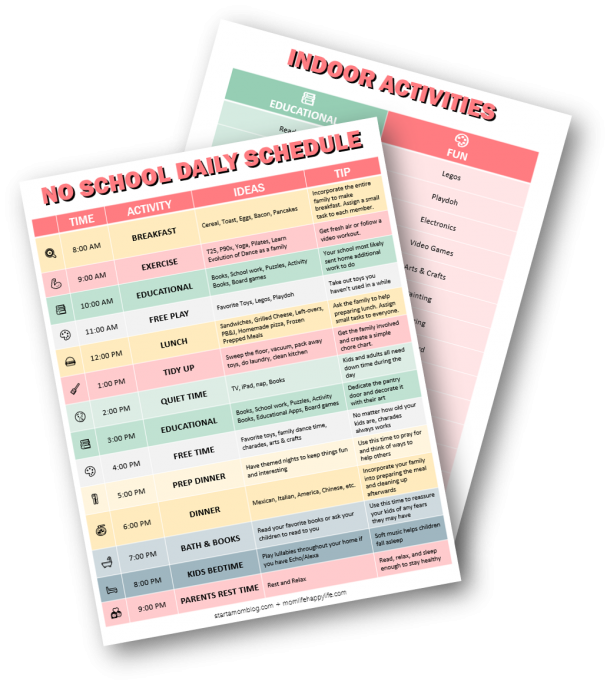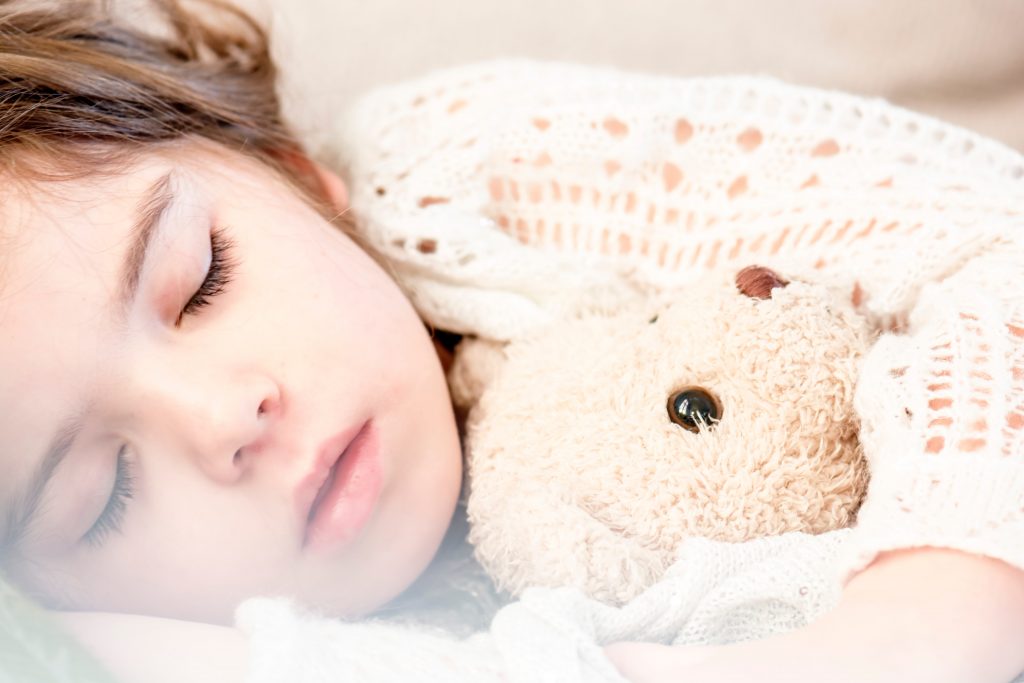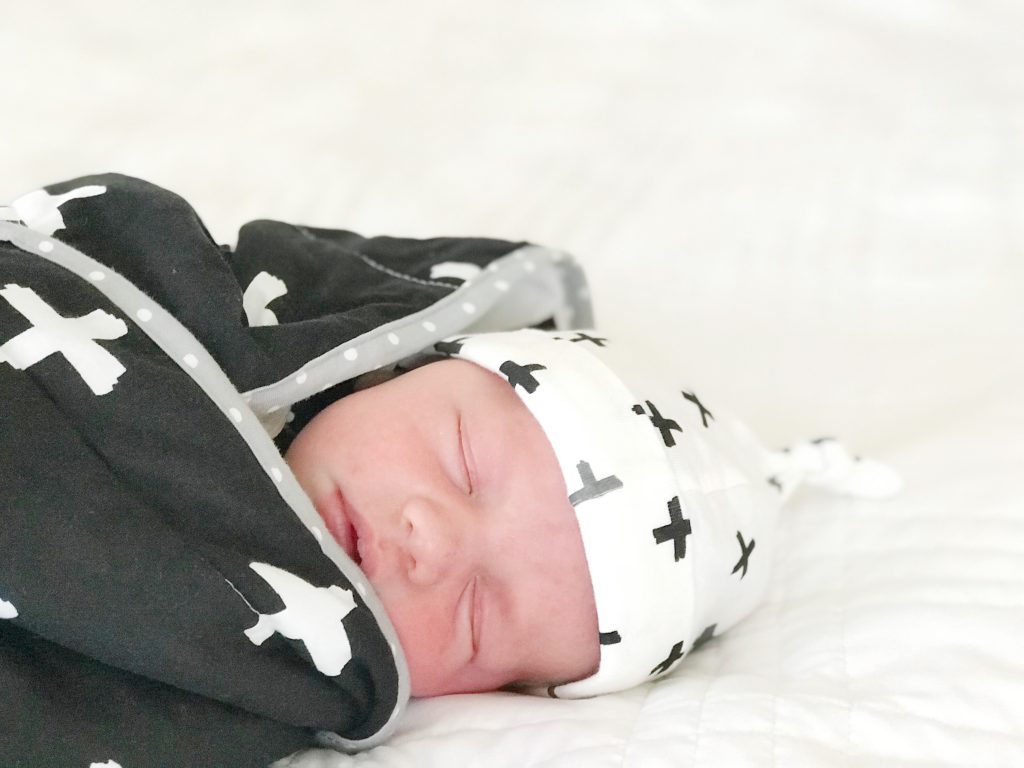Are you wondering if you really need a playpen for your baby?
Ask any new parent and they’ll tell you that having a newborn baby makes your house look like a baby bomb has gone off. They come with so much stuff!
It can be so confusing trying to figure out what you actually need and what you can live without.
Maybe you’re pregnant and putting your gift registry together. Or maybe your sweet little baby is becoming a bit more mobile. You’re starting to notice all the potential hazards in your living room.
Maybe you have mixed feelings about playpens (sometimes called play yards). Are they a lifesaver, knowing your baby is safe when you leave the room? Or are they little baby prison cells destined to give you more mom guilt? Do you really need a playpen for your baby?
A baby does not need a playpen however it does provide a safe place for you to put your baby down when necessary. If you have housework or need to use the bathroom, it can give you peace of mind that your baby is in a safe space for a short period of time.
If you are considering whether a playpen is right for you and your baby and you want to learn more, then read on.

Is a playpen really necessary?
It isn’t an essential newborn item such as a crib or a car seat. But your family circumstances and home life will influence how essential one is for you and your home.
If you’re home alone with your baby all day every day, you might need a safe space to put your baby down so you can do things you need to do. You know, things like eating or taking a shower.
If your home is very small or you have people around to help you, a playpen may just take up valuable space with little benefit for you.

The pros and cons of playpens
What are the benefits of a playpen?
- Safe space – The main benefit of a playpen is providing a safe space for you to put your baby down when you have other things to attend to. Once your baby becomes mobile you need eyes in the back of your head. It’s reassuring to know your baby is in a safe place while you cook dinner, answer the door or just want to use the bathroom alone.
- Independent play – Playpens are a great way to encourage your baby to get used to being alone for short periods of time. You can leave a couple of toys with them and leave the room knowing they’re safe. You can also sneak a peek from close by without being seen.
- Peace and quiet – A playpen can be a little sanctuary of peace and quiet for your baby if you have other small children playing boisterously.
- Multipurpose – Playpens come in all shapes and sizes. Some have a base and mattress and can be used as a crib. They can be collapsible and portable, taken on holiday or out to the garden. Some can be used in different shape combinations as a fireguard or a room divider.
What are the downsides of a playpen?
- Size – Playpens are usually quite big and take up a lot of space. If you have a small house or apartment you might feel you just don’t have the space for one. In small rooms, a large playpen will reduce the amount of space available for baby to move around the room.
- Cost – They can be expensive although you can always find second-hand ones quite cheap.
Mom guilt – Is a playpen a baby jail cell? Is that really something else we need to feel bad about? In my opinion, no, not at all. And you’ll find there are a lot of opinions out there about whether or not babies should be in a playpen. The main concern is whether or not it’s bad for their development.
Are playpens bad for development?
Being in a playpen is not bad for a baby’s development. Being alone and isolated obviously is. There’s no research about babies’ development and playpens specifically. That research would never be possible.
Concerns that parents would leave their baby in a playpen alone and isolated for hours at a time with no interaction, led people to think playpens were cruel.
Be sure your baby is only in a playpen for short bursts of time. Give some toys for entertainment and stay close by. You can rest assured knowing your baby’s development won’t be affected at all.
Playpens should also never be used as punishment or a place for a time-out. This will cause your baby to view it as a negative place.
What age can a baby go in a playpen?
A playpen is typically used once your baby becomes mobile. Bum shuffling, crawling and walking means your baby won’t be in the same spot they were when you left the room! This is when a playpen is really useful.
It’s a good idea to start using it for short periods before your baby is mobile. Around 4-6 months and once baby can roll over and hold a toy is a good time to start. This gives them a chance to get used to it before they start moving and feel restricted.
When should I stop using a playpen for baby?
You can use a playpen until your child reaches 34 inches or 30 lbs in weight. If you have a little Houdini and your toddler can climb out stop using it straight away. Once your baby can pull themselves up to standing, remove any large toys that could be used to help an escape.
You can find more great playpen safety advice here.

How long should a baby stay in a playpen?
There is no set length of time a baby should be in a playpen but the less the better. Babies should only be in a playpen for short periods when needed and not for hours at a time. If the playpen can be in the same room as you, that’s great. If not, check in on baby every 5-10 minutes. Babies shouldn’t be left completely unsupervised in playpens.
The length of time your baby will happily stay in the playpen will vary too depending on age, mood and temperament. Younger babies may want your attention pretty quickly. Toddlers may happily play with their toys a little longer.
What can I use instead of a playpen?
There are alternatives to traditional playpens if you are short on space or you just don’t think a playpen is right for you.
- Baby proof your rooms – use safety gates, corner pads and store electrical wires safely, etc. and let your baby have the run of the room. This is an excellent resource for babyproofing your house room by room.
- Travel cot – they tend to be smaller, can double up as a safe space for baby to sleep during the day and are collapsible and portable.
- Baby activity centers and walkers – these alternatives are smaller than playpens, allow baby to stay mobile and provide entertainment too. They are also much easier to move from room to room meaning you can always keep baby close by.
- Mesh or plastic playpens – there are loads of different designs, fabrics and colors available now that you may find more pleasing to look at in your home.
- Get creative – Use what you have! The empty bathtub in the bathroom, high chair in the kitchen, a big cardboard box (we all know how much kids love a box). Your baby gets a little safe space in whatever room you’re in. Bonus, you can see each other and interact at the same time.

So are baby playpens worth it?
Ultimately it’s your decision and as long as you’re happy with it, that’s all that matters.
Baby playpens are worth having if you need a safe space to confidently leave your baby for short periods of time.
And it’s totally fine to want to pee alone or drink your coffee while it’s hot.
Find a playpen that meets your needs and space availability at home. Get your baby used to their space early on so they are happy there once they become mobile.
There are lots of alternatives available if decide a playpen is not right for you and your baby
What are your thoughts?
I’d love to hear more about your thoughts and experiences of playpens so share in the comments below!




When my children were babies I used a playpen. It kept them safe while I was cooking, cleaning or taking a little “me” time with a book or a phone call. I was a stay-at-home Mom as were my friends. We had strollers and went walking a lot so socializing was not a problem. Plus they had a lot of cousins. So yes for playpens. Moderation is always a key word
I never felt the need for a playpen for either of my two children. Once they were big enough to roll over or crawl, I would pop them in their crib with a few favourite toys for a short time when necessary. When it was sleep time there were no toys beyond a favoured blanket or stuffie so they never seemed confused about when it was sleep or play time.